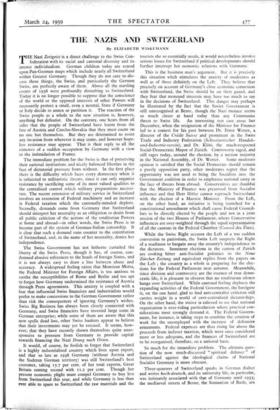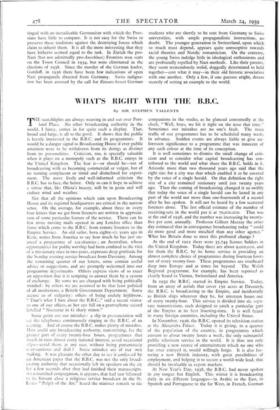THE NAZIS AND SWITZERLAND
By ELIZABETH WISKEMANN
THE Nazi Zeitgeist is a direct challenge to the Swiss Con- federation with its racial and cantonal diversity and its intense individualism. German children today are reared upon Pan-German maps which include nearly all Switzerland within Greater Germany. Though they do not care to dis- cuss these things, the Swiss, and particularly the German Swiss, are perfectly aware of them. Above all the startling events of 1938 were profoundly disturbing to Switzerland. Today it is no longer possible to suppose that the conscience of the world or the opposed interests of other Powers will necessarily protect a small, even a neutral, State if Germany or Italy decide to annex or partition it. The reaction of the Swiss people as a whole to the new situation is, however, anything but defeatist. On the contrary, one hears from all sides that the people of Switzerland have learnt from the fate of Austria and Czecho-Slovakia that they must count on no one but themselves. But they are determined to resist any invasion from wherever it may come, and however hope- less resistance may appear. That is their reply to all the rumours of a sudden occupation by Germany with a view to the intimidation of France.
The immediate problem for the Swiss is that of preserving their national institutions and nicely balanced liberties in the face of dictatorial pressure from without. In the first place there is the difficulty which faces every democracy when it is subjected to militaristic threats, since it can only organise resistance by sacrificing some of its most valued qualities to the centralised control which military preparations necessi- tate. The recent extension of military service in Switzerland involves an extension of Federal machinery and an increase in Federal taxation which the cantonally-minded deplore. Secondly, demands come from Germany that Switzerland should interpret her neutrality as an obligation to desist from all public criticism of the actions of the totalitarian Powers at home and abroad—in other words, the Swiss Press is to become part of the system of German-Italian censorship. It is clear that such a demand runs counter to the constitution of Switzerland, and, in the name of her neutrality, denies her independence.
The Swiss Government has not hitherto curtailed the liberty of the Swiss Press, though it has, of course, con- demned abusive references to the heads of foreign States, and it is not always easy to draw a line between abuse and accuracy. A widespread feeling exists that Monsieur Mona, the Federal Minister for Foreign Affairs, is too anxious to soothe the susceptibilities of Rome and Berlin and too apt to forget how Germany undermined the resistance of Austria through Press agreements. This anxiety is coupled with a fear that influential Swiss financiers and industrialists would prefer to make concessions to the German Government rather than risk the consequences of ignoring Germany's wishes. Swiss Big Business has always been closely connected with Germany, and Swiss financiers have invested large sums in German enterprise; while some of them are aware that this now spells dead loss, other Swiss bankers appear to believe that their investments may yet be rescued. It seems, how- ever, that they have recently shown themselves quite unre- sponsive to pressure from Germany to provide capital towards financing the Nazi Drang nach Osten.
It would, of course, be foolish to forget that Switzerland is a highly industrialised country which lives upon export, and that so late as 1938 Germany (without Austria and the Sudeten German territory) was still Switzerland's best customer, taking 15.7 per cent. of her total exports, Great Britain coming second with 11.2 per cent. Though her present economic plight must compel Germany to buy less from Switzerland this year, and while Germany is less than ever able to spare to Switzerland the raw materials and the tourists she so essentially needs, it would nevertheless involve serious losses for Switzerland if political developments should further interrupt her economic relations with Germany.
This is the business man's argument. But it is precisely this situation whch stimulates the anxiety of moderates as well as of those definitely on the Left. They believe that precisely on account of Germany's close economic connexion with Switzerland, the Swiss should be on their guard, and they fear that moneyed interests may have too much to say in the decisions of Switzerland. This danger may perhaps be illustrated by the fact that the Soviet Government is still unrecognised at Berne, though the Nazi menace seems so much closer at hand today than any Communist threat to Swiss life. An interesting test case arose last December, when the resignation of the Minister for Finance led to a contest for his post between Dr. Ernst Wetter, a director of the Credit Suisse and prominent in the Swiss Trade and Industry Federation (Schweizerischer Handels- und-Industrie-verein), and Dr. Rion, the much-respected Social-Democratic Mayor of Zurich. Controversy raged, and still rages today, around the election, by a narrow majority in the National Assembly, of Dr. Wetter. Some moderate opinion is satisfied that the Social Democrats should remain a purely opposition party, other moderates regret that the opportunity was not used to bring the Socialists into the Government coalition in order to emphasise national unity in the face of threats from abroad. Conservatives are thankful that the Ministry of Finance was preserved from Socialist influence and that Herr Hitler cannot reproach Switzerland with the election of a Marxist Minister. From the Left, on the other hand, an initiative is being launched for a constitutional amendment which shall cause Federal Council- lors to be directly elected by the people and not in a joint session of the two Houses of Parliament, where Conservative influences are over-weighted through the equal representation of all the cantons in the Federal Chamber (Conseil des Etats).
While the Swiss Right accuses the Left of a too sudden conversion to patriotism, the Swiss Left suspects the Right of a readiness to bargain away the country's independence to the dictators. Imminent elections in the canton of Zurich are evoking bitter anti-Socialist polemics in the Neue Ziircher Zeitung and equivalent replies from the papers on the Left ; the country as a whole is preparing for the elec- tions for the Federal Parliament next autumn. Meanwhile, since division and controversy are the essence of true demo- cratic life, it is pleasant to observe that no totalitarian silence hangs over Switzerland. While cantonal feeling deplores the expanding activities of the Federal Government, the foreigner is, on the one hand, glad to find anti-centralist criticism still carries weight in a world of over-centralised dictatorships. On the other hand, the visitor is relieved to see that national organisation is over-riding particularism where practical con- siderations most strongly demand it. The Federal Govern- ment, for instance, is taking steps to combine the creation of work for the unemployed with the increase of defensive armaments. Federal expenses are thus rising far above the proceeds from indirect taxation, which were once considered more or less adequate, and the finances of Switzerland are to be reorganised, therefore, on a national basis.
So much for the immediate problem. The ultimate ques- tion of the now much-discussed "spiritual defence" of Switzerland against the ideological claims of National Socialist Germany is more obscure.
Three-quarters of Switzerland speaks in German dialect and writes hoch-deutsch, and its university life, in particular, was intimately associated with that of Germany until 1933; the mediaeval streets of Berne, the humanism of Basle, are tinged with an ineradicable Germanism with which the Prus- sians have little to compare. It is not easy for the Swiss to preserve these traditions against the destroying forces which claim to inherit them. It is all the more interesting that they have hitherto seemed equal to the task. In Zurich the pro- Nazi (but not admittedly pro-Anschluss) Frontists won seats on the Town Council in 1934, but were eliminated in the elections of 1938. Since the murder of the German leader, Gustloff, in 1936 there have been few indications of open Nazi propaganda directed from Germany. Swiss indigna- tion has been aroused by the call for Einsatz-bereit German students who are shortly to be sent from Germany to Swiss universities, with ample propagandistic instructions, no doubt. The younger generation in Switzerland, upon which so much must depend, appears quite unreceptive towards racial theories and Nordic romanticism. On the contrary, the young Swiss indulge little in ideological enthusiasms and are profoundly repelled by Nazi methods. Like their parents, they seem tremendously stolid, doggedly determined to hold together—cost what it may—in their old historic association with one another. Only a few, if one guesses aright, dream secretly of setting an example to the world.















































 Previous page
Previous page